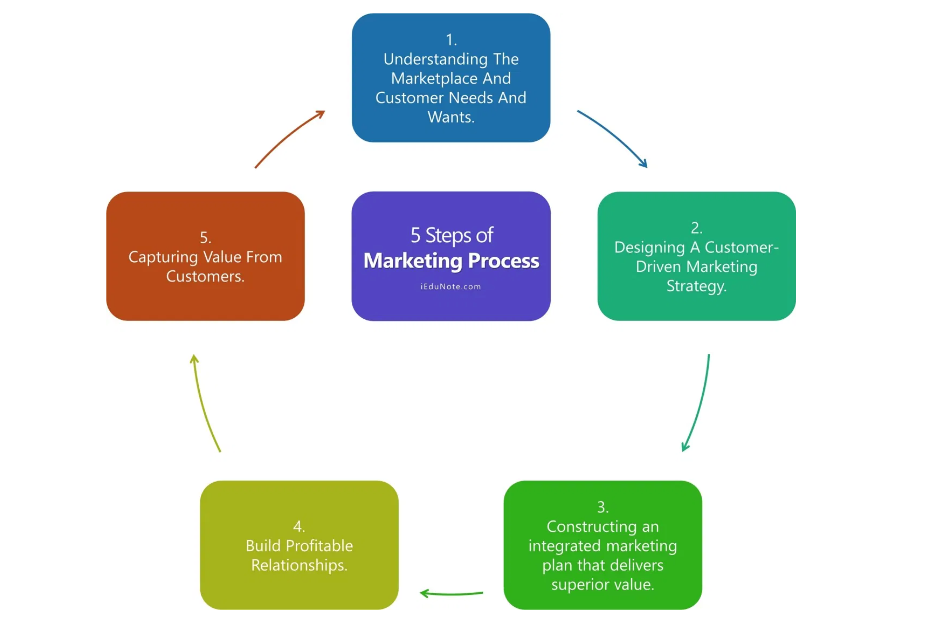Effective marketing showcases your product or service to the right people: potential customers and your current customer base. The result? Brand awareness, leads, referrals, and sales. Sounds great, right?
But good marketing management is often easier said than done. Hiring a dedicated marketing manager to own these tasks can boost your marketing efforts and free up energy and time, allowing you to focus on growing your business. Furthermore, as with many areas of your business, there is an established process you can follow to improve and optimize your marketing management.
In this brief guide, we'll explore what marketing management is, the marketing management process, and how ultimately to run your marketing team in the most effective way possible.
What is marketing management?
Marketing management refers to the control and operations of various marketing activities and the people involved in those activities, such as managers, marketing management professionals, contractors, and more.
Relevant actives often include:
- Setting goals and developing marketing strategies
- Performing market research
- Devising marketing campaigns
- Identifying a company’s target market
- Managing content on various channels (e.g., social media, email marketing, etc.) and across different mediums (e.g., copy, images and videos, and podcasts)
- Execution of marketing strategies and marketing plans
What do marketing managers do?
A marketing manager is a person responsible for executing a company’s marketing plan via delegation and planning.
Relevant actives often include:
- Implementing a standard operating procedure (SOP), which outlines how specific (and, often, routine) tasks should be performed
- Researching the business’s target market and customer base
- Creating, planning, and executing campaigns
- Creating and sharing branded content on social media platforms (e.g., Instagram or TikTok)
- Leading the creation of and scheduling of email newsletters and campaigns
- Tracking key metrics like page views, social media engagement, and email open rates
- Creating digital and/or print content to generate brand awareness
- Any additional tasks and needs
Given the wide range of duties a marketing manager may handle, the position requires a working knowledge of the standard marketing mix, including various platforms (e.g., Google Analytics), social media channels (e.g., Facebook), and marketing best practices (e.g., best times to send email blasts).
Depending on the type of business and its marketing goals, marketing professionals may also need to have expertise in search engine optimization (SEO), social media marketing, or content creation. For example, an ecommerce business may require SEO specialization to help content rank on Google, whereas an events business may need a social media specialist to create buzz and attract attendees. A generalist may do a little bit of everything in order to help the business drive revenue and develop expertise in certain areas over time.
A marketing manager’s scope of duties can also vary based on the company’s size or industry. At a larger company, for instance, a marketing manager may oversee a team of specialists. At a smaller company, a marketing manager may perform many of the tasks themselves.
5 things marketing managers do
Though marketing managers’ jobs vary by business or industry, in general, you can expect a marketing manager to lead or assist with general marketing management processes and help keep the marketing department on track.
Here's an example of how it might look when mapped out to the marketing process.

1. Evaluate product and market fit
In a discussion with Shopify President Harley Finkelstein, Martha Stewart offered this product-development advice to entrepreneurs: “Does the customer need it? Does the customer want it? If the business or product idea answers yes to either of those two questions, you’re probably on to something that will be successful.” It’s a marketing manager’s responsibility to make sure customers understand how your products meet their needs and wants.
To do this, they might survey your customer base about product features while gathering feedback on customer satisfaction and product-market fit. For example, a marketing manager can send out a survey to the company’s email list and ask them to rate their satisfaction with the product, how frequently they use the product, what would make it better, and how they would feel if it were no longer offered in the marketplace.
This process outlines the things your customers adore while providing insight regarding areas of improvement. Positive feedback can show up in marketing collateral because it communicates what your existing customer base loves about your product. Areas of improvement can go straight to the product development team or business owner, so they can make adjustments.
At a large company, this work may fall to a product marketing manager. But on a small team, a generalist marketing manager will lead these efforts.
2. Craft a marketing strategy
The cornerstone of marketing management is creating and executing a marketing strategy—a roadmap designed to take your revenue from point A to point B. This is a concrete plan that utilizes different channels and mediums to market the company’s product or service. This is done through market research, customer interviews, and even analyzing feedback from customers.
While the end goal of all marketing management is to increase sales, a marketing strategy includes much more than creating an incentive to press the Buy button. It creates a customer journey, which takes a potential customer from the very first time they hear of your brand to the moment when they purchase—and beyond. This customer journey is divided into three stages:
- Awareness stage. A customer realizes that they have a problem to solve and that your brand may offer a solution (e.g., someone is planning a hiking trip and realizes they need better hiking boots).
- Consideration stage. The customer reviews potential solutions (e.g., they read the specifications of your hiking shoes to determine if they might fit the bill).
- Decision stage. The customer makes an informed decision to buy (e.g., they determine that your shoes are of better quality for a reasonable price, and they buy).
A marketing strategy will specify how to reach customers at every stage and what type of content to show them. Strategic marketing management is about getting the most out of your marketing efforts and team.
3. Create brand messaging
Brand messaging communicates a brand’s mission and personality, and its products’ value proposition(s) to its customers. Put another way: Brand messaging communicates what your company stands for, who it’s for, why it exists, and what makes it unique.
Marketing managers will contribute creative ideas and strategic insight to guide the development of marketing messaging. Specifically, they’ll create:
- A mission statement
- Positioning statements
- Ad taglines
- Website copy
- Channel-specific copy for social media, email, and more
On a small team, they’ll own this process completely.
4. Track marketing metrics
Marketing managers may set goals and track key metrics to measure the performance of a campaign, including:
- Website traffic. Website metrics include page views, bounce rates, and the time spent on each page.
- Social media. A marketing manager or social media team tracks the number of followers, comments, and shares, and engagement rate across platforms.
- Email. For email campaigns, key metrics include email subscribers, open rate, click-through rate, and conversions.
- SEO. Success for an SEO strategy is measured through search rankings, organic sessions, click-through rate, new users, and top keywords.
- Advertising. Advertisers track cost per lead, cost per click, return on investment, and conversion rate to measure the success of their campaigns.
- Customer relationship management: Are customers happy? Is there a high churn rate?
Tracking these metrics provides valuable data on the status of your marketing campaigns and marketing programs as well as helps demonstrate the impact they’re having on your small business. For example, tracking open rates on emails can let you know how successful your email newsletters are at getting customers to engage with your brand. Not getting enough opens?
You may tweak subject lines or add images and emojis. Reviewing page views each month or every quarter can provide relevant feedback on a company’s SEO strategy and how content is landing (or not). Marketing managers can translate that data into informed action, such as where to allocate additional resources, where to pause marketing efforts, or where to take a different action plan altogether.
5. Build a great team
As your business grows, a marketing manager may need to hire a team or contractors to keep up with a growing marketing mix and get much-needed support.
- Sets expectations. A marketing manager establishes measurable goals and communicates expectations for the team's marketing efforts.
- Review output. A marketing manager may periodically review the team’s output and performance and make adjustments. For example, if engagement is down on social media, what new tactics could help generate more likes, shares, and follows?
- Act as a leader. When a marketing manager builds a team, they become a manager of people and marketing work. They will mentor budding channel specialists and secure resources to support the group. They’ll also liaise with leadership to set goals and share results.
- Oversees tools and resources. A marketing manager can help procure the right tools for the job, which can include social media scheduler, email marketing platform, design program, task management tool, SEO keyword research tool, analytics tools, and marketing automation tools.
- Create processes and workflows. A marketing manager can create specific processes and workflows for the team. Having a workflow in place can eliminate questions about what should be done and when it should be done and by whom, so everyone stays on task with their defined marketing efforts.
- Manage the marketing budget. A marketing manager may also manage the marketing budget, which can include software and tools, staff salaries, events, and advertising costs.
Making that first marketing hire can help small business owners transition marketing responsibilities to a pro. The result should be sales growth—and more time for the business owner to focus on the big picture.
Effective marketing management is often the key to success for your marketing, and when done right can be a significant competitive advantage. From digital marketing to everything in between, it's time you start taking marketing management seriously.
by Shopify Staff
https://www.shopify.com/blog/marketing-management













